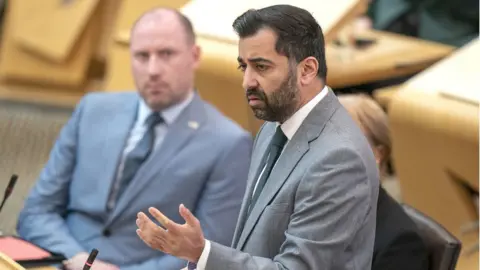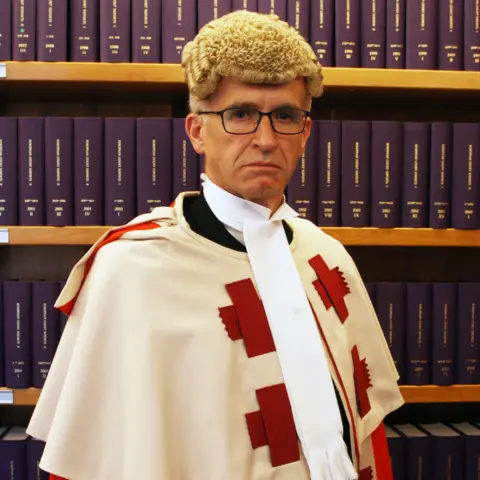Humza Yousaf: Convicted rapists should go to prison
 Spindrift
SpindriftFirst Minister Humza Yousaf believes those convicted of rape should go to prison but said sentencing decisions had to be made by the courts.
He was responding to questions about the case of Sean Hogg, who raped a 13-year-old girl when he was 17 but was given 270 hours of community service.
This was due to the judge applying new sentencing guidelines for under 25s.
But Mr Yousaf said custodial sentences could still be imposed in such cases.
There has been public outcry over the case after Judge Lord Lake said that if Hogg had committed the crime when he was over 25, he would have given him a jail sentence of four or five years.
The Crown Office has said it is considering whether there are grounds for lodging an appeal against the sentence.
At First Minister's Questions, Scottish Conservatives leader Douglas Ross asked Mr Yousaf about the case which involved the young teenager being raped in Dalkeith Country Park in 2018.
He said the sentence made it very clear that the SNP's justice system was "broken".
Mr Ross quoted the victim who questioned why she had bothered to report the rape in the first place and asked why it was OK to rape anyone and not go to jail.
In response, Mr Yousaf said: "I read the very distressing account of the victim and also heard from her family - I think everybody would sympathise with the strong feelings of the victim.
"Talking in general, 98% of all those convicted of rape between 2018 and 2021 did receive a custodial sentence."
 PA Media
PA MediaWhen Mr Ross said it should be 100% of rapists going to prison, Mr Yousaf said: "I agree with the sentiment that if someone commits rape they should go to jail but I also believe very firmly that it is up to judges and those in the high court to make a decision about what the appropriate punishment is for an individual for the crime that they have committed."
Mr Yousaf said sentencing guidelines were entirely the responsibility of the independent sentencing council and said decisions on approving the guidelines were a decision for the independent judiciary. He added that the guidelines were comprehensive and evidence-based.
He said it was important that the judiciary remained independent from the government.
Mr Yousaf said the guidelines made it "very, very clear" that there was no bar on imposing a custodial sentence on a young person "where the judiciary consider that to be appropriate".
"But that must be a decision, not for the first minister, not for government ministers, neither for opposition colleagues - it is a decision, rightly, for the independent judiciary," he said.
He added that Justice Secretary Angela Constance had written to the sentencing council to discuss how it planned to keep the published guidelines under review.
'I did not get justice'
Hogg's rape victim, now 18, said she had been diagnosed with PTSD, suffered from panic attacks and self-harmed on a daily basis. She had also undergone three years of counselling.
On learning about his sentence, she said: "It makes me think, why did I even bother reporting the rape in the first place. Nothing happened.
"Whoever is in charge of the justice system needs to sort this out: you say you care about victims like me, but how can a serial rapist receive 270 hours community payback?
"I did not get justice, the system failed me, the judge failed me, he didn't protect me. You let him go, but gave me, the victim, a life sentence."
 Judiciary of Scotland
Judiciary of ScotlandMr Yousaf said he took her comments "very, very seriously indeed".
He said the Criminal Justice Reform Bill would seek to make changes in order to improve the outcomes of justice for victims of sexual offences and rape.
The guidelines for sentencing under-25s were introduced in Scotland in January 2022.
They made rehabilitation rather than punishment a primary consideration, recommending an "individualistic approach" taking into account their life experiences.
